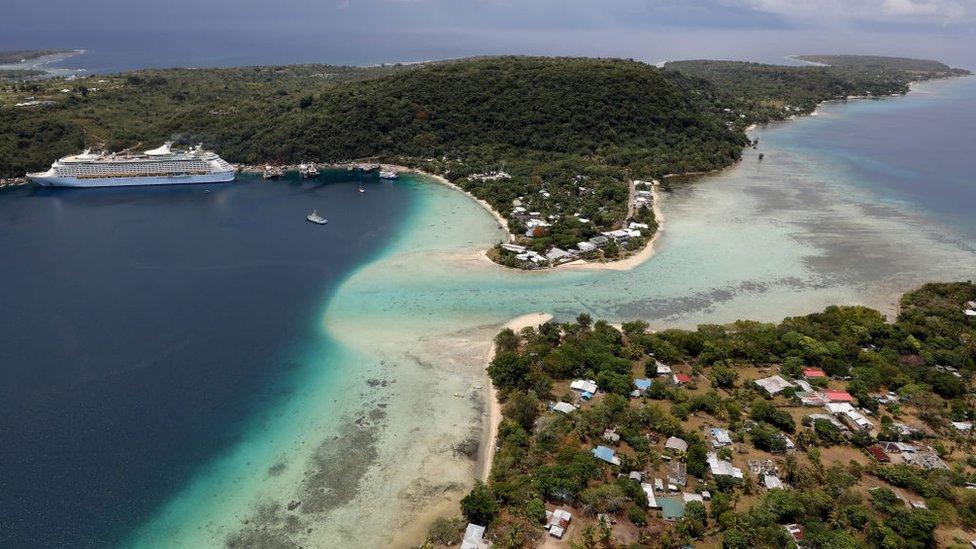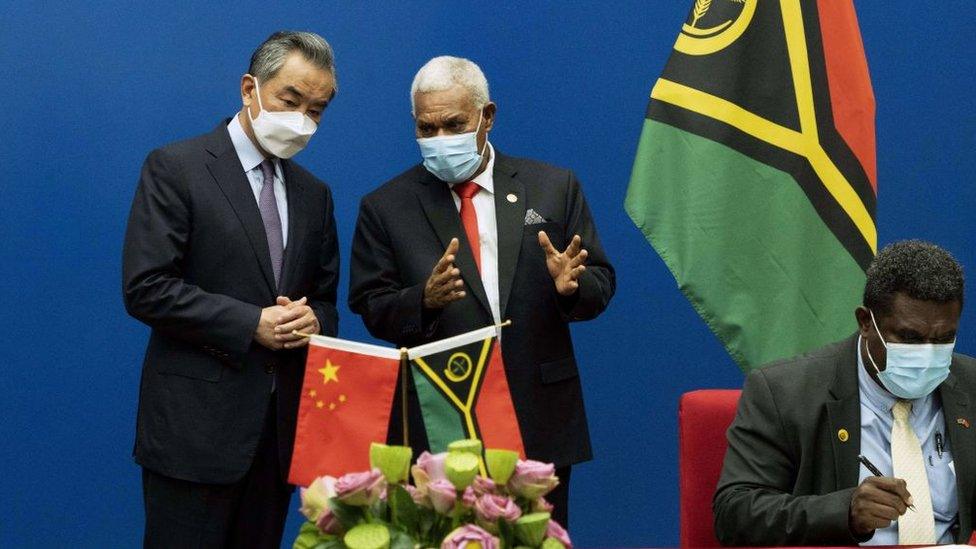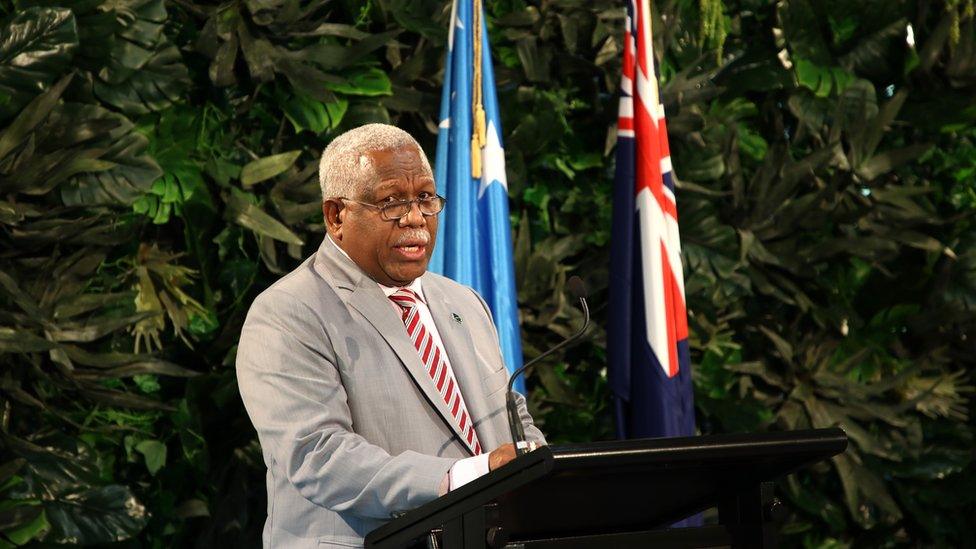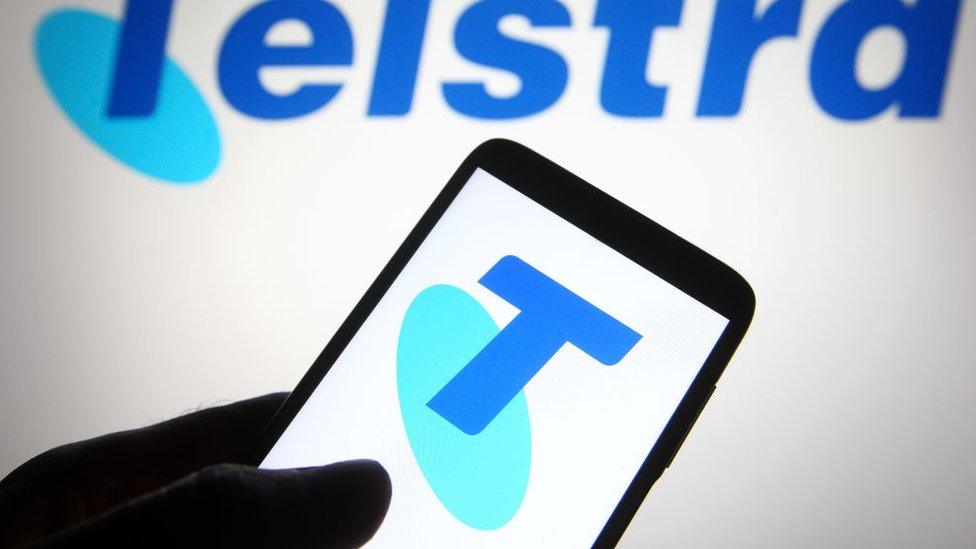Vanuatu: Hackers strand Pacific island government for over a week
- Published

All government systems are down in Vanuatu after a suspected ransomware attack
Vanuatu's government has been knocked offline for more than 11 days after a suspected cyber-attack on servers in the country.
The hack has disabled the websites of the Pacific island's parliament, police and prime minister's office.
It has also taken down the email system, intranet and online databases of schools, hospitals and other emergency services as well as all government services and departments.
The shutdown has left the nation's population - about 315,000 people living across several islands - scrambling to carry out basic tasks like paying tax, invoicing bills and getting licences and travel visas.
Essentially anyone with a gov.vu email or domain has been affected, locals told the BBC.
"Anyone who tried to do anything with the government knew the system was down," said Ginny Stein, an Australian journalist and communications consultant who spent years living in Port Vila, and left on Monday.
"My experience of trying to check out of the country... well they just couldn't operate. They were really struggling to get basic things done."
She described major delays to any applications to government as officials have resorted to manual systems and in many cases even shut up shop.
"You'd walk into the offices and they were closed or they were turning you away saying 'come back next week maybe, but we don't know'," she said.
Still, government staff have done their best to keep things going - with some using their own personal emails and internet hotspots for essential work.
Instead of electronic transfers, people have been paid with cheques. One civil servant relayed the experience of walking from department to department to get the relevant checks and sign-offs on an application. Others have been taking notes manually.
What happened?
According to civil servants who spoke to the BBC on condition of anonymity, it appears the government's servers were taken out on Friday 4 November.
Emails bouncing back from government addresses were the first sign something was wrong, residents said.
"If you take out the government internet… it affects everything. You want to do shipping? You've got to get stuff through approvals through customs. It affect airlines. It affects the health system - there isn't one bit of it that's unaffected," said Ms Stein.
No one from the government or the Prime Minister's office has yet returned the BBC's calls.
But AFP news agency and the Vanuatu Daily Post carried a government statement saying its online system had been "compromised" for two days.
There appears to be a financial motivation. Australian newspaper The Sydney Morning Herald, external reported the attackers had demanded a ransom, which the Vanuatu government refused to pay.
No detail has been disclosed about the value of that extortion bid, or who the hackers are.
It's also unclear how the attack occurred and what protections Vanuatu had in place. Experts have noted the whole system was likely centralised and hosted on the government's own servers, a fundamental security flaw.
The island has already pledged to upgrade its system. In the meantime it's asked neighbouring Australia - traditionally its largest aid partner - to help rebuild its network.

As of Wednesday, the government domain was still down. A spokesman told the Herald the government's website "should be back next week".
Why might Vanuatu have been targeted?
The attack has come less than a month after a new government was elected - a potential time of vulnerability. "But the new government has responded quickly and not agreed to the ransom request," said Dr Meg Keen, director of the Pacific Islands Programme at the Sydney-based Lowy Institute.
"We don't yet know who is behind this attack, but a government spokesman has suggested it was an outside attack, likely from the Asia region."
Some have speculated that the hack may have originated in Indonesia. Vanuatu has long supported the independence movement in the Indonesian province of West Papua, where much of the population is Melanesian. The Indonesian military is accused of gross human rights abuses in the province.
Others note Vanuatu's position in the Pacific region - as a key nation that has relations with the US, China, Australia and New Zealand.
This year has seen Pacific Island nations courted by both Washington and Beijing. Island leaders were invited to the White House in September, while China's foreign minister carried out a whistle-stop tour around the Pacific in June seeking a regional deal.
In recent years, Vanuatu has become one of the Pacific islands closest to Beijing. Chinese investment has built its parliament house, sporting stadium and convention centre. Beijing has an embassy in Port Vila, while Washington's representation is a three-hour flight away in Papua New Guinea.
However, Australia - allied with the US - has for over four decades been Vanuatu's largest aid donor and closest security partner.

Chinese Foreign Minister Wang Yi visited Vanuatu in June, securing some bilateral agreements
Internet provision is a critical utility. Last year, the Australian government funded its telecoms giant Telstra's purchase of Digicel Pacific, a Pacific telecoms company, in a move widely seen as a political block to China's influence in the region.
There had been talk that Digicel might sell its Pacific arm to Chinese state-owned operator China Mobile. Australia also secured an internet cable for the neighbouring Solomon Islands in 2018.
Dr Keen said Vanuatu, like other countries, aimed to secure its government information from external attacks. She noted a "global vulnerability" to such attacks - including in Australia, where hacks on a health insurer and telecommunications firm in recent weeks have exposed data of nearly half the population.
But Vanuatu has far fewer resources. Its economy is largely reliant on farming and tourism. The low-lying nation has been ranked among the most vulnerable to climate change.
"The attack is an added strain on public systems," Dr Keen said.
Ms Stein, who had worked in government departments in Vanuatu, noted the country's internet system had appeared fragile - with variable internet coverage and limited server capacity.
"It's a really miserable thing to do to a small island nation that just doesn't have the resources to deal with this," she said.
Related topics
- Published13 June 2018

- Published25 October 2021

- Published16 July 2022
